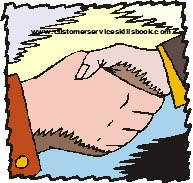The Role of Channel Partner Relationships on Customer Loyalty
A key component of managing customer loyalty is for organizations to effectively establish and manage channel partner relationships. Such partners can help gain access to new business opportunities at lower costs, without having to merge or acquire more assets and employees. This means that retail and service pricing can be kept down. Such a strategy also provides a more competitive posture for your organization and potentially attracts and holds customers based on reduced pricing and enhanced product and service availability.
Through channel partner relationships organizations are able to build a larger and stronger competitive presence in the marketplace, which can help enhance customer trust and loyalty. This potentially occurs because customers view the organizations as a larger and stronger supplier or entity.
There are three types of typical channel partners with which your organization might build a relationship if you do not already have one in place. Transactional or indirect. This type of organization provides a distribution outlet or link for your company’s products and services. The challenge is that they maintain no specific loyalty and when the opportunity arises to obtain a newer product or service line, or one that is less expensive, they may move to other suppliers or vendors. Examples of transactional partners are online Web sites (e.g., Amazon.com and Overstock.com), retail stores, or service providers (e.g., plumber, laundry, pest control, masseuse/masseur, and car repair). Tactical. This category of partners include organizations that are intricately meshed with your company’s internal operations. Examples of such arrangements include mobile phone service providers that use retail outlets (e.g., Best Buy or mall kiosks). Strategic. The third type of channel partnership involves signing agreements through which one organization creates a long-term alliance with one another to brand, develop, or produce each other’s products or services. An example of this is the code sharing that takes place between airlines where two different airlines can sell seats on a single plane under their own individual flight numbers.
About Robert C. Lucas
Bob Lucas has been a trainer, presenter, customer service expert, and adult educator for over four decades. He has written hundreds of articles on training, writing, self-publishing, and workplace learning skills and issues. He is also an award-winning author who has written thirty-seven books on topics such as, writing, relationships, customer service, brain-based learning, and creative training strategies, interpersonal communication, diversity, and supervisory skills. Additionally, he has contributed articles, chapters, and activities to eighteen compilation books. Bob retired from the U.S. Marine Corps in 1991 after twenty-two years of active and reserve service.
Make Money Writing Books: Proven Profit Making Strategies for Authors by Robert W. Lucas at Amazon.com.
The key to successfully making money as an author and/or self-publisher is to brand yourself and your company and to make yourself and your book(s) a household name. Part of this is face-to-face interaction with people at trade shows, library events, book readings, book store signings, blogging or guest blogging on a topic related to their book(s). Another strategy involves writing articles and other materials that show up online and are found when people search for a given topic related to a topic about which the author has written.
If you need help building an author platform, branding yourself and your book(s) or generating recognition for what you do, Make Money Writing Books will help. Bob’s popular book addresses a multitude of ideas and strategies that you can use to help sell more books and create residual and passive income streams. The tips outlined in the book are focused to help authors but apply to virtually any professional trying to increase personal and product recognition and visibility.
In my book Customer Service Skills for Success, I define customer service as “the ability of knowledgeable, capable, and enthusiastic employees to deliver products and services to their internal and external customers in a manner that satisfies identified and unidentified needs and ultimately results in positive word-of-mouth publicity and return business.”


